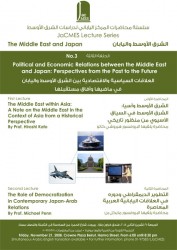“Political and Economic Relations between the Middle East and Japan: Perspectives from the Past to the Future”
| Date / Time | Friday, November 21, 2008. 18:00- 20:15 |
|---|---|
| Venue | Crowne Plaza, Hamra Street |
| Language | Arabic and English (simultaneous interpretation available) |
| For further Information | 01-975851 (JaCMES) |
| 18:00-18:10 | Welcome Address: Prof. Hidemitsu Kuroki (Director, JaCMES) |
|---|---|
| 18:10-18:50 | Lecture 1: Prof. Hiroshi Kato “The Middle East within Asia: A Note on the Middle East in the Context of Asia from a Historical Perspective” |
| 18:50-19:05 | Discussion |
| 19:05-19:20 | Coffee Break |
| 19:20-20:00 | Lecture 2: Prof. Michael Penn “The Role of Democratization in Contemporary Japan-Arab Relations” |
| 20:00-20:15 | Discussion |
- Lecture 1
- “The Middle East within Asia: A Note on the Middle East in the Context of Asia from a Historical Perspective”
By Hiroshi Kato - Prof. Hiroshi Kato a prominent Japanese scholar of the modern Egyptian history, teaches economic history of the Middle East at Hitotsubashi University, Tokyo. His publication includes “A Historical Study of the Market Society-Reflected in the Waqf System in Muslim Societies,” Annals of Japan Association for Middle East Studies (2004); “Migration, Regional Diversity, and Residential Development on the Edge of Greater Cairo,“GIS-Based Studies in the Humanities and Social Sciences (2005); and “Rashda: A Village in Dakhla Oasis,” Mediterranean World (2008).
- Summary :
This lecture will deal with the politico-economic relationship between the Middle East and Asia (especially East Asia) in the 21st century, by reviewing its history and by introducing several Japanese academics’ opinions on this subject. The main points of discussion will be
(1) The Middle East: a region that disappeared from the narrative of modern economic history,
(2) The Middle East in the context of modern Asian economic history, and
(3) The Middle East within Asia in the 21st century.
The lecturer agrees to an opinion of a Japanese economic historian, Professor Kaoru Sugihara, to the effect that one of the most important questions that East Asia will face in this century is how to maintain “the oil triangle” in the global economy. “The oil triangle” means the world-scale settlement pattern of international trade between East Asia, the Middle East and the West (US and EU) since the 1970s. “The oil triangle” could be the foundation of the world economic order in the 21st century, although its theory should be partially modified by the challenges from the countries such as Russia, India, and Brazil that have been developed in recent years. - Lecture 2
- “The Role of Democratization in Contemporary Japan-Arab Relations”
By Michael Penn - Prof. Michael Penn teaches at the University of Kitakyushu, Fukuoka, Japan, and is Executive Director of Shingetsu Institute for the Study of Japanese-Islamic Relations, an open research institute that examines Japan’s connections with the Islamic world from a variety of perspectives. He has published more than twenty articles including “Islam in Japan: Adversity and Diversity” in Harvard Asia Quarterly (2006) and “East Meets East: An Ottoman Mission in Meiji Japan” in Princeton Papers (2007). He is currently preparing his first full length book for publication on the topic of Japan and the War on Terrorism.
- Summary :
This lecture will review the role of “democratization” in Japanese foreign policy under the Koizumi, Abe, and Fukuda administrations (2001-2008). First, the political character of the three prime ministers’ policies will be contrasted. During the period of Shinzo Abe’s premiership, the notion of democratization began to play a significant role under the “Arc of Freedom and Prosperity” initiative led by Foreign Minister Taro Aso. However, the current Japanese leader, Yasuo Fukuda, is not a believer in integrating the goal of democratization into Japanese foreign policy; instead, he prefers to put emphasis on political stability and the cultivation of good relations with regimes of all character. While the US-Japan alliance has remained the fundamental basis of Japanese policy toward the Arab nations in recent years, there have been notable shifts in the diplomatic language that has accompanied Japanese foreign policy statements. This has had a certain degree of impact on Japanese policy toward Iraq, Lebanon, and Palestine, in particular. On the other hand, Japanese relations with Egypt and the six nations of the Gulf Cooperation Council do not seem to have been affected in any way by these subtle shifts in diplomatic emphasis.

